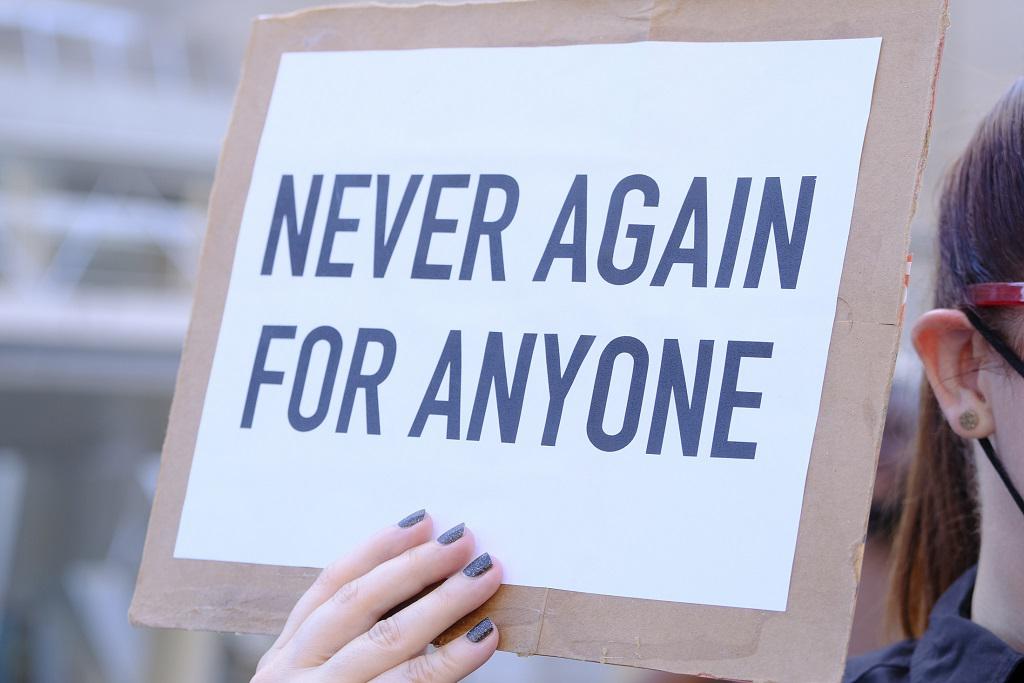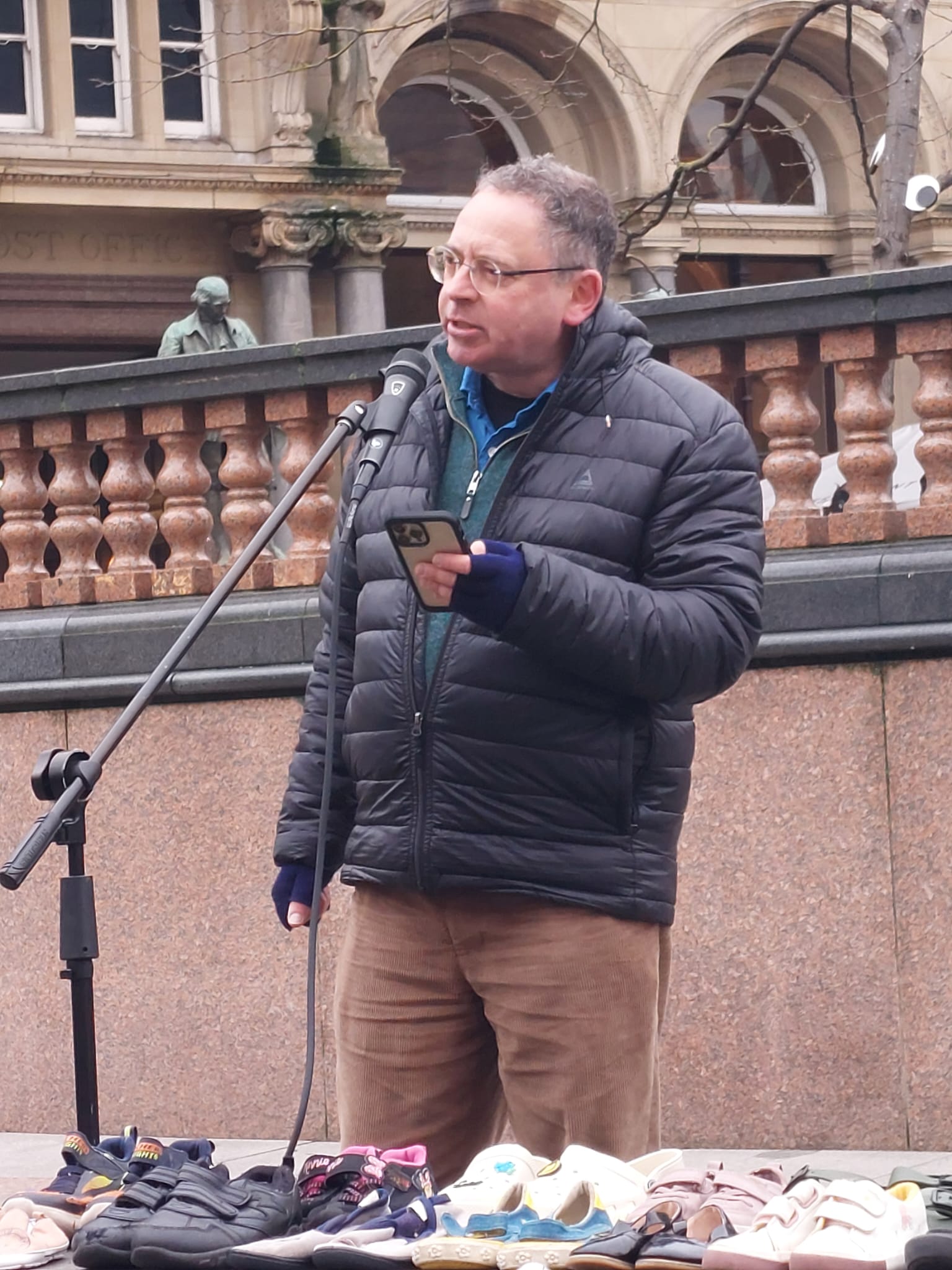Never again for anyone
by Robert Cohen
We are gathered here in Leeds City Square to mark Holocaust Memorial Day.
Tomorrow will be the 80th anniversary of the liberation of the Auschwitz-Birkenau death camp in Poland in 1945.
It’s estimated that more than a million people perished in Auschwitz during the Second World War. The vast majority were Jews. But there were also Roma and Sinti and Gays, all murdered just for who they were.
In all, it’s estimated that six million Jews were killed by the Nazis during the Holocaust including around 1.5 million children.
The Nazi Holocaust destroyed a third of the global Jewish population, with centuries of culture and heritage lost forever.
And the world said: NEVER AGAIN. But genocide did happen again.

Which is why, on Holocaust Memorial Day, we are also encouraged to remember the victims of genocides in Cambodia, Rwanda, Bosnia, and Darfur.
None of these subsequent genocides detract from, or diminish, the magnitude of the Nazi Holocaust. And nor should they. The point of highlighting other genocides is not to draw equivalence with the Nazi Holocaust. Every genocide has been unique in its form, scale and execution. But they all share some common traits including collective discrimination, dehumanisation and the intent to exterminate (in whole or in part) a distinct people.
The Holocaust Memorial Day Trust encourages us to learn from past genocides so that we can, in its own words “take action for a better future”. A future in which “identity-based persecution and discrimination” comes to an end.
The Holocaust Memorial Day Trust takes its lead from the UK government in determining if a genocide has taken place. But what happens if our own government is itself implicated in a genocide? How do we then act for a better future?
We cannot always wait until courts and governments have reached a unanimous agreement on whether a genocidal atrocity is taking place. Too often, that only happens long after the horrors have ended and when there is nothing left to be done. And, as has become abundantly clear in these last 15 months, reaching such a consensus is a political decision as much as a legal or moral one.
This year the official organisers of Holocaust Memorial Day events, the HMD Trust, has shown its reluctance to acknowledge even the potential that a genocide has been taking place in Gaza. A genocide perpetrated by the State of Israel against the Palestinian people, but with the finance, weapons and diplomatic cover coming from
the United States, and with support from America’s Western European allies, including the United Kingdom.
The Trust has asked event organisers around the country, as well as teachers in schools, not to refer to what has been happening in Gaza since the 7th of October 2023. That includes the Hamas atrocities in Southern Israel which left nearly 1,000 Israeli civilians brutally murdered and 250 men, women and children kidnapped into Gaza.
I know some will want to frame the Hamas attack as anti-colonial resistance. Just as some will say that Israel was simply acting in self-defence when it launched its attacks on Gaza.

But if you are serious about the value of international law and a rules-based global order, then neither ‘anti-colonial resistance’ nor ‘self-defence’ can be used to justify mass atrocities.
At least 47,000 people, mostly civilians, including 18,000 children, have been killed by Israel using American-made and paid-for weapons. Independent health and humanitarian experts put the number of dead much higher than Hamas itself has done.
100s of thousands of Palestinians have been injured. Many of those injuries will be life-changing.
Homes, schools, universities, mosques and churches have been destroyed. Civil infrastructure, including access to water and healthcare, has been deliberately demolished. Agricultural land has been ruined. An already weak economy has been wrecked.
There has been mass hunger and the risk of mass starvation caused by Israeli political decisions.
Millions have been displaced. And in this fragile ceasefire, they find they have no home to return to, only rubble and the buried remains of children, mothers, fathers, and grandparents.
But the Holocaust Memorial Day Trust fears that talking about Gaza will politicise commemorations and detract from Holocaust remembrance.
We are gathered here today because we profoundly disagree with that thinking.
When the International Court of Justice has recognised that accusations of genocide against Israel are legitimate and must be investigated…
…when the judges at the International Criminal Court have issued warrants for the arrest of the Prime Minister of Israel…and Hamas leaders…
…when Amnesty International and Human Rights Watch have called Gaza a genocide…
…when scholars of the Holocaust and genocide, including Jewish Israeli academics, have called Gaza a genocide…
…when Genocide Watch, a global organisation recognised as experts in genocide, has called Gaza a genocide…
…then refusing even to acknowledge that a potential genocide has happened, undermines the work and the moral authority of the Holocaust Memorial Day Trust.
The Trust’s refusal to mark what has happened in Gaza is itself a deeply political act.
To place Gaza off limits when it comes to who we are allowed to grieve in the context of genocidal harm, does not honour those murdered in the Holocaust or subsequent genocides.
Nor does such a decision respect international law or its institutions.
Taking such a stand ignores the testimony of Palestinians in Gaza. It ignores the Palestinian journalists who have risked or lost their lives. It ignores the live-streamed images of indiscriminate, mass destruction we have watched on our phones for months on end.
We should not make decisions about genocides based on where our funding comes from. Or which national allies will be implicated or shamed. Nor should we create hierarchies of suffering in which the collective trauma of one group is used to suppress the suffering of another. That’s not how you address antisemitism or build societies that will fight racism and resist the politics that can lead to genocide.
That’s why we feel the need to hold this event today. Because we must say:
NEVER AGAIN FOR ANYONE.
We will spend our time here sharing readings and standing in silent vigil to mark the genocides of the past and the ones which have been taking place today.
We will recall the Nazi Holocaust, Cambodia, Rwanda, Bosnia, Sudan and Gaza. And we must also remember the genocidal acts which have been committed in recent years in China against the Uyghur Muslims, in Myanmar against the Rohingya Muslims, in Syria and Iraq against the Yazidi people, and the war crimes against civilians in Yemen and Eritrea.
Because there can be no hierarchies of remembrance and no exceptions to acknowledging genocides.
Today we grieve for all who have lost their lives through tribalism, nationalism and racism. And we commit ourselves to ending genocide wherever it takes place and whoever is the perpetrator.
NEVER AGAIN MUST MEAN NEVER AGAIN FOR ANYONE, ANYWHERE.
Thank you for being here.
On behalf of the organisers of today’s event, we thank you all for coming and for the respect you have shown for all those lives lost to the horrors of genocide.
We see with heavy hearts how Christians, Muslims, Jews, and people of other faiths and no faith, have been the victims of genocide and, tragically, also the perpetrators of genocide. No people or nation should consider themselves incapable of committing such atrocities.
We also recognise, that ‘starting the clock’ of genocide remembrance with the defeat of Hitler has obscured the atrocities committed by Western European nations through imperialism and colonialism in the earlier 20th century and in the centuries before. Failing to reckon with this past does not help us to build resilience against the politics of dehumanisation today or in the future.
Right now, we must keep our eyes, and our hearts focused on Gaza and on Sudan where genocide has been and still is taking place.
The world’s attention may move on. The political attempts at denial and normalisation (especially regarding Gaza) will no doubt continue. And those who dare to say the word ‘genocide’ about Gaza will go on being ostracised and vilified.
Our task is to keep saying:
NEVER AGAIN FOR ANYONE, ANYWHERE.
*****************************************
